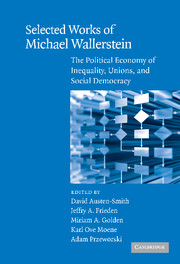 Selected Works of Michael Wallerstein
Selected Works of Michael Wallerstein Book contents
1 - GENERAL INTRODUCTION
Published online by Cambridge University Press: 27 January 2010
Summary
Michael Wallerstein's tragic death at the age of fifty-four deprived the world of one of its leading political economists. For twenty-five years Wallerstein had been in the forefront of rigorous analysis of the political economy of contemporary industrial societies. His research on relations between labor and capital, on labor organization, and on inequality and redistribution framed and advanced the study of central problems in modern politics and economics. This volume brings together Wallerstein's principal contributions, in the hope that their joint impact will demonstrate the scale of Wallerstein's achievement and advance the values that guided his life work.
Michael Wallerstein and Modern Political Economy
The modern study of political economy is quite recent. Forty years ago the term was barely used, and it was rare for scholars in the mainstream of the social sciences to study the interaction of political and economic forces. There were, to be sure, some scholars in the Marxist tradition, and others in the newer tradition of public choice theory, who analyzed aspects of the relationship between the economic and political systems. But there was no generally accepted field of political economy, and there was virtually no interaction between the two disciplines best suited to study it, political science and economics.
Today political economy is one of the most dynamic fields of investigation in both economics and political science, with a plethora of conferences and journals and handbooks of its own, displaying some of the biggest names in the social sciences.
- Type
- Chapter
- Information
- Selected Works of Michael WallersteinThe Political Economy of Inequality, Unions, and Social Democracy, pp. 1 - 6Publisher: Cambridge University PressPrint publication year: 2008
